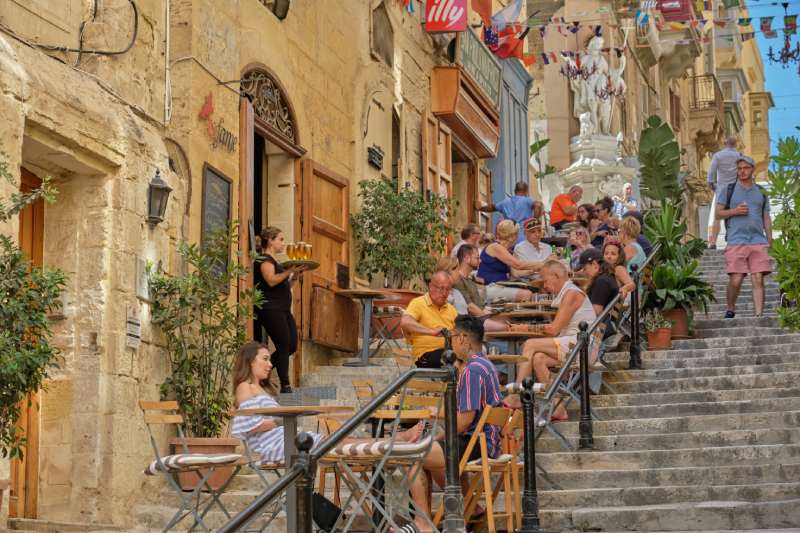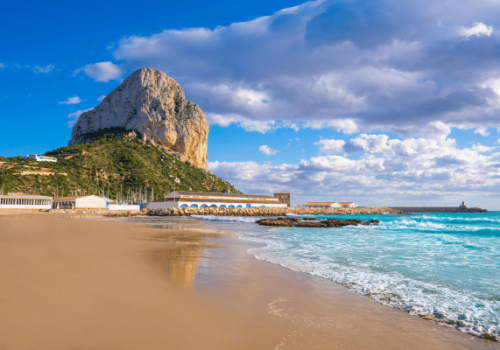Living and Working in Spain
Information & guidance about seasonal jobs in Spain
A Mediterranean climate, a vibrant culture, and stunning natural beauty. Spain is undeniably one of the world’s most popular destinations. Diverse cultures, languages, culinary traditions, and climates give each region of the country its own unique traditions and scenes. From the bustling, wild, and sizzling nightlife in Madrid to the scenic wonders, the tourist-friendly coasts of the Costa Brava, the passionate flamenco performances in the mountains of Andalusia, and the secluded fishing villages in Galicia; Spain truly has it all! Keep reading to discover what it’s like to live and work in Spain.
Permanent jobs in Spain
- Customer support
- Greece, Malta, Spain
- Customer support
- Spain
Seasonal jobs in Spain
- Customer support
- Greece, Malta, Spain
Spain offers many jobs in it’s summer tourist industry. The Canary Islands of Tenerife, Lanzarote and Gran Canaria, The Balaric Islands Of Menorca, Majorca and Ibiza as well as the the Costa del Sol, and the Costa Blanca are all good places to looking for hospitality work. Opportunities range from chefs, bar staff, kitchen assistants, holiday reps, DJs and ticket sellers and promotional staff.
Several British and European camping companies operate throughout France and jobs can be found in the summer working in campsites.
Au Pairs usually need some childcare experience but won’t always need to be able to speak fluent Spanish. Au pairs live with host families, looking after the children and perform basic domestic duties such as cleaning. Wages are often low but food and accommodation is usually included.
Spain’s agricultural produce includes oranges, olives, grapes and strawberries. Andalucia is a large region with opportunities for fruit picking. Some farmers may pay you depending on how much fruit you can collect, how much it is worth at market or how long it takes you so the wages won’t always be decent.
Smaller Earth Live and work abroad in Spain. Becoming an Au Pair in Spain is the perfect way to make new friends, learn or improve your Spanish language skills and experience the culture as a local.
Voluntary job opportunities In Spain Include immigration issues, the environment, poverty and women’s rights.
Traveltowork Can Assist With Setting Up A Bank Account In Spain Before You Leave Home.
Spain Visa Information: If you intend to visit Spain, on holiday, a business trip, to study, work, volunteer or as an emigrant you should get up to date and accurate information from the official website of the Ministry Of Foreign Affairs Spain.
For up to date information on visa requirements, you can also check with the Embassy or Consulate of Spain before you travel.
Work in Spain
Working in Spain: Rules and Working Conditions
There are plenty of reasons why working in Spain is so appealing. Overall, the quality of life in Spain is quite high. With numerous hours of sunshine each year, friendly people, a plethora of holidays (14), and a Mediterranean lifestyle, you might wish there were more hours in a day.
While in most cities, the standard workday is from 9 to 5, many places in Spain still observe the siesta. Siesta is typically taken between 14:00 and 17:00, but this varies by location. Depending on the region, working hours might also be between 09:00 and 14:00 and 18:00 and 21:00 in Spain.
Salaries in Spain
The average gross monthly salary in Spain in 2020 was €2,038.60. Moreover, the highest average gross monthly salaries can be found in Madrid (€2,350.20), the Basque Country (€2,278.80), Navarre (€2,209.20), Asturias (€2,161.50), and Catalonia (€2,158.10).
Regarding sectors, the highest gross monthly salaries can be found in the financial sector (€3,152.50), the energy sector (€3,034.10), IT and computer science (€2,809.50), and the public sector (€2,800.80).
Working in the Spanish Hospitality Sector
Are you interested in spending your summer abroad while earning some extra cash? We recommend looking for a fun vacation job in the tourist areas of Spain. Especially in tourist destinations along the Spanish coast, such as the Canary Islands and Ibiza, there is a high demand for additional labor.
Hospitality and tourism are the most popular sectors in Spain, especially during the summer months. Many restaurants, nightclubs, cafes, campsites, and hotels are in need of multilingual employees who are willing to lend a hand. Think about positions like waitstaff, campsite workers, chefs, and hotel receptionists. Another common job is an entertainer in a hotel, where you’ll organize fun shows, activities, and performances for the entire family.
Hospitality jobs are perfect for people who are proactive, flexible, sociable, and up for an exciting challenge abroad. Speaking multiple languages is a plus, with Spanish, Italian, English, and German being especially valuable.

Voluntary work in Spain
Most Spanish cities offer voluntary work that can and will make a difference to Spanish communities. Each city, small or big, has a unique landscape and cultural identity, making it even more interesting to explore and chat to the locals with the aim to uncover what the cities unique characteristics are. A few of the most popular locations are Valencia and Barcelona.
Valencia is surrounded by the Meditteranean Sea as well as incredibly protected forests. The forests intrigue many volunteers year round, especially revolving around interests in conservation and ecology. These projects allow volunteers to explore on their time off, such as hiking or even enjoying the famous Valencian paella!
Barcelona – “the city that never sleeps”… means there are plenty of activities to take advantage of when the volunteering ends! During the day, you can explore Gaudi’s architecture speckled throughout the streets and up to the hills of Park Guell and visit the many beaches to soak up the sun. Then staying at the beach until night time to watch the beach light up with dance clubs on the sand, with the best musicians playing and flocks of people visiting for Barcelona’s summer music festivals, with all music genres.
Volunteering projects in Spain
Voluntary work in Spain is popular due to the countries affordability, diverse landscape and of course the famous food and drink. Many education voluntary placements can be found in every Spanish city while volunteers looking for work related to conservation should look in the more coastal areas of the country.
Education: Teaching English in Spain is very popular with volunteers, with opportunities to teach children or adults available in every city. Other education related voluntary work opportunities include tutoring programs for disadvantaged children, working within childcare professions or working with the community in general public health issues.
Conservation: Spain has large amounts of protected natural areas, both on land and in the sea. Popular conservation voluntary work in Spain include helping restoring habitats through maintaining forests and planting trees, or collecting behavioural and environmental data about sea creatures.
Living in Spain
Advantages of Living and Working in Spain
Wouldn’t you want to swap the dull winter and rainy autumn for the Spanish sun? The warm climate is one of the most significant reasons to live and work in Spain. But there are many more reasons to embark on this fantastic adventure. Living and working in Spain is incredibly enjoyable because Spain is a pleasant country. The quality of life in Spain is high, thanks to the abundant hours of sunshine each year. Additionally, the population is very friendly, and the culture is intriguing. There are relatively many holidays, and the Mediterranean lifestyle is very pleasant.
Due to the sunny climate in the South European cities, people spend a lot of time outdoors, engaging in various activities. Whether you want to go for lunch, take a nice walk, spend a few hours exercising, or enjoy an evening in a cozy café, it’s effortless to find people to do these activities with. Before you know it, you’ll become part of a friendly group of friends, and you might even spontaneously plan a day of kitesurfing, for example.
Spaniards are generally seen as an open-minded and hospitable people. Building your own circle of friends and social contacts is vital. The time dedicated to social interactions is a significant and fixed part of the day. This includes visiting bars and nightclubs, dining together with family and friends, and going on excursions. Even as a foreigner or newcomer, you are more than welcome to join the circle of friends. Moreover, Spaniards are very helpful. In short, living and working in Spain is a celebration! Are you looking forward to it?
Accommodation in Spain
If you plan to live and work in Spain for an extended period, there’s good news because finding affordable accommodation in Spain isn’t too challenging. However, since Madrid and Barcelona are extremely popular among tourists and expats, finding suitable living spaces in these cities can be a bit of a challenge.
If you want to explore the options for yourself, you can choose to go exploring by staying in a hostel. This will cost you about €10 to €30 per night. In a budget 2-star hotel, you’ll pay an average of €40 for a double room. Through Airbnb, you can get a room for €20 per night, while a house will cost you around €50 per night.
Rental prices in Spain can vary greatly by region. In small towns and villages around cities, rental prices are quite low (around €200 to €400 per month). In cities, rental prices are higher. Although it varies by city, in a city like Madrid, monthly rent typically ranges from €300 to €900. In Barcelona, you can find simple and small accommodations with rent prices between €300 and €450 per month. For a more luxurious apartment that you don’t have to share with a roommate, you’ll pay between €400 and €800 per month.
Check out this blog with the top 10 cities in Spain to figure out which Spanish city suits you best.
Websites we recommend for finding accommodation in Spain are:
Furthermore, in a city like Barcelona, vibrant neighborhoods like Raval, Gòtic, El Born, L’Eixample, Sarrià-Sant Gervasi, La Vila de Gràcia, El Poble-Sec, El Poblenou, or Sant Antoni are highly recommended. Additionally, neighborhoods like Puerta del Sol, La Latina, Lavapiés, Barrio de las Letras, Chueca, Salamanca, and Malasaña are also great places to live.

Transportation in Spain
Public transportation in Spain is very well developed and reasonably priced compared to other European countries. In major cities, you can use the train, tram, or bus for around €1.50. Of all the transportation options, the bus is the most economical choice. If you want to explore the country and take a bus trip from Barcelona to Madrid, a bus ticket costs around €39.
Going Out in Spain
In Spain, apart from enjoying good food, you can also have an amazing nightlife experience. Experience Spain’s famous nightlife and party like the locals!
Spain is renowned for its vibrant nightlife. The party typically gets started later in the evening at a tapas bar or a restaurant. In Spain, every occasion is seen as a reason to celebrate.
Spain has many festivals, often referred to as “fiestas,” that are celebrated extensively. It’s incredibly fun to partake in these Spanish fiestas. Spaniards know how to turn everything into a celebration. Spain has numerous national holidays, and many cities or regions have their own additional holidays. Spanish parties and fiestas are celebrated with a lot of food and drink, and often, live bands as well. You can also participate in various traditional activities. During fiestas, people enjoy being outside, celebrating with each other, and savoring the delightful weather.
There are numerous bars, clubs, and pubs in Spain where you can party all night long.
The popular coastal towns include Lloret de Mar, Salou, Blanes, and Malgrat de Mar. Especially in the summer, many young people head here to have fun and relax on the beach. During the summer, there are countless parties with well-known DJs.
The Spanish islands are also known for their clubs, and Ibiza is highly popular. Every year, many international DJs perform in Ibiza. The clubs on Ibiza are a bit more upscale, but they still attract many young people. Additionally, the island of Mallorca is incredibly popular among young people, and there are also plenty of nightlife options on the Canary Islands.
In major cities like Valencia, Madrid, and Barcelona, you have a wide range of choices for going out. From small pubs to massive clubs with multiple rooms or floors, there’s something for everyone. Visiting a Spanish club is definitely worth it if you’re planning to live and work in Spain.
Food in Spain
Eating in Spain equals pure delight!
From Spanish cavas, local sausages (think of chorizo), cheeses (such as Manchego), and beverages (Sangria is very popular!) to typical dishes (calamares a la romana, paella), when you think of Spanish cuisine, you’re likely thinking of tapas. Spanish cuisine is rich and diverse, with a multitude of traditional dishes that will make your mouth water. Living and working in Spain is perfect for anyone who enjoys trying various dishes.
The prices of snacks and meals are lower than in the Netherlands or Belgium. In one of the many bakeries in Spain, you’ll pay around €2.50 for a snack, and for lunch, you’ll spend about €15. For a complete meal with a glass of authentic Spanish wine, you’ll typically pay €20-€30. If you’re adventurous, explore and step into small, local restaurants and eateries. Here, you can order various delicious tapas dishes for a small price. If you enjoy cooking at home, it’s good to know that you’ll spend an average of only €40 per week on groceries. With this budget, you can purchase products like fish, meat, vegetables, fruit, and other basic items.

The Landscape and Nature of Spain
Spain is the second country in the world with the most UNESCO-designated biosphere reserves: lakes, mountains, volcanoes, marshes, forests, rivers, valleys, and cliffs. The landscape of Spain is incredibly diverse and fascinating. In Northern Spain, many bears and wolves inhabit the region.
In the northeast of Spain lies the region of Aragón. Here, high mountains are filled with canyons, ravines, and forests. Aragón is often referred to as the outdoor paradise of Spain. From skiing and paragliding to canoeing on rivers and hiking through the mountains, outdoor enthusiasts will find their haven in Catalonia too. Thirty percent of Catalonia’s territory is protected to preserve wildlife and natural ecosystems.
In the largest region of Spain, Castile and León, keep your binoculars handy! This region is perfect for bird enthusiasts. Castile-La Mancha (the heart of Spain) is rich in oases amidst windmills and hills, endless olive groves, and steep mountain ranges. To the west lies the region of Extremadura, a beautiful area with valleys, rivers, and mountain ranges. On the other side, in Valencia, you can enjoy an abundance of orchids.
What You Shouldn’t Miss When Working in Spain
Seville
Spain boasts many beautiful cities! The Royal Madrid, the historical Toledo, or the palm city of Elche are cities that you must see. But then there is Seville. The largest city in the Andalusia region, the city where Flamenco lives. The neighborhood of Barrio de Santa Cruz is considered the birthplace of Flamenco. Additionally, in the district of El Arenal, you will find many attractions. In short, Seville is a city you simply must visit!
Sagrada Familia
Antoni Gaudí, as an architect, is responsible for many significant buildings in Barcelona. His most impressive creation is Sagrada Familia, an enormous basilica that has been awaiting completion for over a century. Many rightly consider this building to be Gaudí’s masterpiece. If all goes well, Sagrada Familia will be fully finished in 2026. If you are embarking on the adventure of living and working in Spain, you must pay a visit to the world-renowned Sagrada Familia!
Canary Islands
When you think of the Canary Islands, you probably think of sun, sea, and beach. However, the landscapes of the Canary Islands have a unique character, mainly due to their volcanic origin. Some are lush, like La Palma and the north of Tenerife, while others are rugged and rocky, such as Lanzarote. In Timanfaya National Park on Lanzarote, the volcanic origin is clearly visible, and this park is still accessible to the public. You can enjoy the volcanic landscape here.
Camp Nou
If something is sacred in Spain, it is football. Every weekend, millions of passionate football fans follow the matches in La Liga. FC Barcelona vs. Real Madrid is the classic and is often compared to Ajax vs. Feyenoord. The football stadium in Barcelona can almost be called a football temple. The stadium is now half a century old and is no longer among the most beautiful stadiums architecturally. It is the history and magic of the club that matter. This makes visiting Camp Nou a must-do when you are living and working in Barcelona.
Ibiza’s Nightlife
When you think of Ibiza, the first thing that comes to mind is partying and nightlife. It is party island number one! Young and old can visit the famous clubs spread across the island every day of the week. The world’s best DJs frequently come to Ibiza to take their place behind the turntables. When you go out in Ibiza, you can dress extravagantly and there is no consideration for age and background, although you will have to dig deep into your pockets if you go to the big parties. The entrance fee is quite expensive, and you will surely also be surprised by the prices of drinks. Either way, you must have been to Ibiza at least once in your life.
El Escorial
About 50 kilometers from the capital, Madrid, stands the immense complex of El Escorial. This is the former palace of Philip II, which was built in the second half of the sixteenth century. The building is on the UNESCO World Heritage List and is a combination of a castle, abbey, basilica, mausoleum, and library. The Royal Monastery of El Escorial attracts many visitors from around the world every year.
Bilbao
The Basque city of Bilbao is a unique Spanish city. Bilbao has a distinct character, and it is worth mentioning that the city is on the Pilgrimage Route to Santiago. There are at least two important reasons to visit Bilbao. First, you will find the beautiful Guggenheim Museum here: Guggenheim Museum Bilbao. Additionally, Bilbao is an important culinary city, and pintxos originally come from here. Pintxos are delicious Spanish skewers that are also often eaten as tapas.
Work in Spain FAQs
What do you need to work in Spain?
Have you found your dream job in Spain and are you planning to work in Spain soon? It’s important to know what you need to arrange before you go. Start by checking your passport or identity card. If it’s no longer valid (or expiring soon), make sure to apply for a new one well before your departure.
If you plan to live and work in Spain for more than 3 months, make sure to deregister from your municipality in the Netherlands/Belgium just before your departure. This deregistration certificate is often required to register in Spain. Once you’re in Spain, you’ll need to apply for an NIE (Número de Identificación de Extranjero) number, an identification number for foreigners in Spain, if you intend to stay and work for more than three months. After that, you can go to your local town hall in Spain to complete your registration. Ensure you bring a valid ID, your rental contract, and your NIE number.
If you plan to live and work in Spain for a short time, you can either keep your Dutch/Belgian health insurance or opt for international health insurance. For longer stays, you’ll need to take out health insurance in Spain.
Another important consideration when moving to Spain is your accommodation. You can arrange your apartment even before you physically move to Spain. Check out the websites mentioned above under the “Accommodation in Spain” section.
How long can you stay in Spain?
As long as you have a valid identification document, sufficient means to support yourself, and a valid health insurance policy. Remember that after 3 months, you need to register with the municipality of the province where you reside in Spain. You can even make an appointment online: https://sede.administracionespublicas.gob.es/.
How long can you work in Spain?
Every EU citizen can work in Spain without a work permit. Make sure you have an NIE number and a (Spanish) bank account when signing your employment contract.
Our clients in Spain often offer attractive opportunities for career advancement within their companies. This means you can work for these employers for an extended period, as long as both parties are satisfied!
I want to work in Spain during my gap year. What are the possibilities?
There are numerous options when it comes to spending your gap year. You can take a language trip, do volunteer work abroad, or go backpacking. However, you can also work in Spain for a year. This way, you can explore a new culture, learn a foreign language, meet new people, and gain international work experience without depleting your savings.
On Anywork Anywhere, you can find various types of job vacancies. There are permanent jobs where you’ll work abroad for at least 3, 6, or 12 months. These roles include customer service positions, sales/marketing vacancies, and online croupier positions.
Additionally, we offer holiday jobs on our website. These positions are often seasonal. For instance, you can opt for a summer job as an entertainer, chef, hotel receptionist, or campsite worker in Spain.







